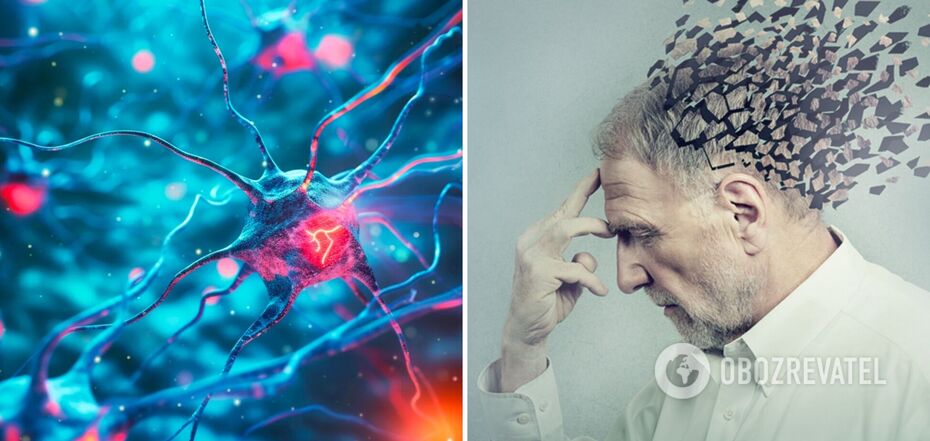News
Alzheimer's disease can be transmitted from person to person, but in rare cases: scientists explain what it is about
Scientists have found that Alzheimer's disease can be transmitted from person to person. However, this happens in rare medical cases.
There is no evidence of transmission in everyday life or during caregiving. The Guardian writes about the findings of scientists.
According to scientists, several people who received human growth hormone from the pituitary glands of deceased donors developed Alzheimer's disease in the early stages, probably because the hormones used were contaminated with proteins that caused the disease.
However, in everyday life, scientists rule out the possibility of such transmission of Alzheimer's disease.
"We are not suggesting for a moment that you can catch Alzheimer's disease. It is not transmitted in the sense of a viral or bacterial infection. Only when people have been accidentally inoculated with essentially human tissue or human tissue extract containing these proteins, which is fortunately a very rare and unusual circumstance," said John Colling, co-author of the study, director of the MRC Prion Unit (Center for Global Infectious Disease Analysis at Imperial College London - Ed.).
In the course of the study, the researchers also found new arguments in favor of the fact that Alzheimer's disease is similar to prion diseases. In particular, there is a similarity in the mechanism by which the proteins involved spread in the brain.
Prion diseases, in particular, include Creutzfeldt-Jakob disease (CJD) and BSE (the so-called "mad cow disease" or bovine spongiform encephalopathy - Ed.) They are caused by the spread of infectious proteins in the brain that do not clot properly. The publication writes that these diseases usually occur spontaneously, but less often they can occur as a result of a genetic mutation or be transmitted through an infected brain or nerve tissue.
In a study published in the journal Nature Medicine, Colling and colleagues report that between 1959 and 1985, at least 1,848 patients in the United Kingdom received human growth hormone extracted from the pituitary glands of cadavers.
However, this practice was banned in 1985 after it was discovered that some patients subsequently died of CJD due to hormones contaminated with proteins that cause the disease.
"Of the 80 such cases in the UK, some were found to have a protein called beta-amyloid in their brains after death - a sign of Alzheimer's disease. Although it was unclear whether they would have developed symptoms of Alzheimer's, other studies have shown that beta-amyloid was present in some batches of hormones and that they caused Alzheimer's-like disease when injected into mice," the publication writes.
The researchers reported findings from all eight people who were referred to the National Prion Clinic between 2017 and 2022.
All had received human growth hormone from cadavers but did not have CJD. Five had symptoms of dementia that met the clinical criteria for Alzheimer's disease, with onset at age 38. In three of the patients, brain scans confirmed the diagnosis, and two had biomarkers that met the criteria for Alzheimer's disease.
Among the other three patients, one was diagnosed with mild cognitive impairment (postmortem tests showed compliance with Alzheimer's disease), the second had cognitive difficulties (biomarker criteria for the disease were recorded), which he reported himself. The third had no such symptoms.
"Five patients had DNA data, but only one showed a genetic risk factor for late-onset Alzheimer's, and none had genetic variants known to cause early-onset Alzheimer's," The Guardian noted.
At the same time, the researchers recorded some symptoms in patients that differ from those characteristic of Alzheimer's disease, which either occurs spontaneously or is associated with a genetic risk. They suggested that these differences may be related to a different origin of the disease or other "strains" of beta-amyloid protein.
"They (the researchers - Ed.) say that the results suggest that Alzheimer's disease may result from treatment with contaminated pituitary hormone. Although the cases involved repeated exposure to contaminated human growth hormone over many years, Colling and colleagues say the findings raise the importance of measures such as ensuring that surgical instruments are effectively decontaminated," The Guardian writes.
At the same time, Andrew Doig, a professor of biochemistry at the University of Manchester, emphasized that experts are already very cautious about the transfer of brain tissue between people. He also emphasized that only eight patients participated in the study, some of them lacked genetic data, and there is no direct evidence of the existence of different strains of beta-amyloid protein.
"While the new type of Alzheimer's reported here is of great scientific interest because it reveals a new way of spreading the disease, there is no reason to fear it, as the way the disease was caused was stopped more than 40 years ago. Transmission of the disease from human brain to brain in this way should never happen again," Doig emphasized.
Earlier, it was reported that Musk's company Neuralink had implanted a chip into the human brain for the first time. It is expected to enable people with paralysis of all limbs to control devices with their thoughts.
Only verified information is available on the OBOZ.UA Telegram channel and Viber. Do not fall for fakes!



























